Hybrid MBA Alum Promoted to Clean Energy Leadership Role
As a Hybrid MBA student in 2019, Dever Haffner-Ratliffe ‘20 spoke to her job in the Washington State government, stating she has the “brain of an MBA but the heart of a public servant.” Now an alum, Dever’s Foster Hybrid MBA was instrumental in her promotion to her new role as the Clean Energy Program Manager for the Washington State Department of Natural Resources. This new role intersects her passions for public service and business for the greater good.
Foster the Future: Business for the Greater Good
In her new role, Dever is responsible for attracting and coordinating clean energy projects to be built on Washington State Department of Natural Resources Trust land. The revenue generated from these leases contributes to schools and local communities. Projects on these trust lands include wind and solar power farms, using wood from timber operations to create heating, and more. She works with the goal of leasing state lands to projects that are low impact but generate high revenue. This is part of a larger Washington State goal to be fully run on renewable energy by 2045.
Dever is passionate about her work as creating clean energy and funding communities align with her core values. She described how her new position is a wonderful combination of her various interests and skills:
“It is a really interesting intersection between renewable energy, which I have a strong background in, public service, which I have a passion for, and business because we are trying to run the trust lands like a profitable business”
Usefulness of an MBA in the Public Sector

Dever with her Hybrid MBA Classmates
In this role, Dever has already begun creating a clean energy business plan and marketing plan, with knowledge from her Hybrid MBA. She commented, “I have already been pulling out my textbooks and texting my old classmates questions.” Dever also found that several of her MBA classes have proved immediately useful in her new role. She noted that the Hybrid MBA negotiations and marketing classes were specifically helpful in her current role. Having marketing knowledge to conduct successful outreach has been extremely helpful in the public sector. Dever’s department benefits from her MBA background as they are legally obligated to generate money from the trust land.
Dever also noted the usefulness of her MBA alumni network. She has been able to network with another alum in the clean energy sector. Additionally, she is still frequently in communication with her Hybrid MBA team, often asking them for job advice or bouncing off new ideas.
Although she loves working in the public sector, Dever also appreciates that receiving an MBA offers you freedom and flexibility: “I chose the MBA because I knew it would be relevant in both the private and public sector.”
“I chose the MBA because I knew it would be relevant in both the private and public sector.”
 Lastly, her advice to those looking to move from the private sector into the public sector: “It is important to note that if you are coming to the state from the private sector it’s a different mission and different culture. Find a role that you are really passionate about and aligns with your values and mission.”
Lastly, her advice to those looking to move from the private sector into the public sector: “It is important to note that if you are coming to the state from the private sector it’s a different mission and different culture. Find a role that you are really passionate about and aligns with your values and mission.”
Continue here to read more about Dever’s experience and drive for the public sector:
Article Originally Posted November 14, 2019
Dever Haffner-Ratliffe, Hybrid MBA Class of 2020, has always been interested in the economics flow, even at a young age. When she was in high school, during the recession, her Dad started a 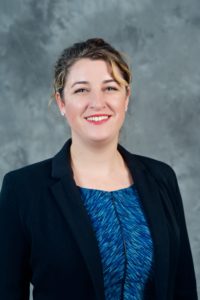
construction company focused on solar and renewable energy and everyone in the family had to participate to ensure the company’s success. Dever’s career started then, working her way up from office assistant to vice president in charge of strategic planning, operations management, marketing, human resources, accounting, legal, and logistics. The company grew to 20 employees by 2015, generating annual revenue around $2 million. Growing up with her Dad’s company solidified Dever’s passion and drive for business.
After almost a decade into the family business, Dever wanted to branch out in her career. Assessing stats in Olympia, WA, she found that the largest employers in her county were public sector and health care. Furthermore, many public sector employees were close to retirement, so she felt that would be a good direction for long term career growth.
Dever is now the Energy Efficiency and Solar Grants Program and Grant Manager for the Washington State Department of Commerce, managing $20 million in grants specific to public entities who can use those funds for energy efficiencies or solar installations, to significantly reduce their operations expenses.
“I’ve always been an empathetic person, I love opportunities to make society better and help the environment. I am focused on more altruistic goals instead of profit.”
So why pursue an MBA? We sat down with Dever to talk about her choice to get an MBA to further her career in the public sector.
Why an MBA vs. MPA?
I was at a point in my life where I realized if I was going to go to graduate school, now was the time. I heard from people that they wished they had started graduate school sooner, so it got me motivated to do it now. And to do it in a way that made sense for my long-term career.
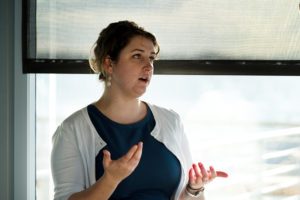 I was looking both at Masters of Public Administration (MPA) and Masters of Business Administration (MBA) until I realized that I was more drawn to the learning offered through an MBA. I have the brain of an MBA but the heart of a public servant. The work I’m passionate about tends to be organizational management, strategic thinking, and problem solving. For long-term career growth, I thought I would be able to learn these skills through an MBA and more easily apply them to any organization.
I was looking both at Masters of Public Administration (MPA) and Masters of Business Administration (MBA) until I realized that I was more drawn to the learning offered through an MBA. I have the brain of an MBA but the heart of a public servant. The work I’m passionate about tends to be organizational management, strategic thinking, and problem solving. For long-term career growth, I thought I would be able to learn these skills through an MBA and more easily apply them to any organization.
I have the brain of an MBA but the heart of a public servant.
An MBA offers more professional versatility. It makes you stand out more in the public sector, where many employees have MPAs. MBAs also seem to hold more weight in the private sector than an MPA, depending on your area. Business approaches are known to be more forward thinking, as corporate competition drives innovation and progress. A business degree helps put you ahead of that curve. Overall, you will walk away with a lot of the same skill sets with both degrees: stats, organization management techniques, etc. For me an MBA is about the innovation that comes from entrepreneurship, which is needed just as much in public service as it is in the private sector.
Ultimately, an MBA is more in line with the type of problem solving and challenges I want to help with on the day to day. And I knew I could immediately apply what I would be learning.
I was accepted into every program I applied for and when I got into Foster, I decided that the reputation, and the hybrid format was the best fit for me.
Why Hybrid MBA?
I was drawn to this program for a lot of reasons – the flexibility of it is great. Saving 50 hours a quarter by not having to drive to Seattle is a big plus! The prestige and re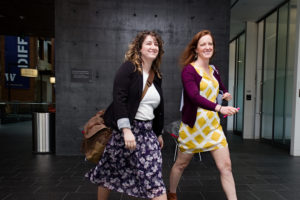 putation of the Foster School was also really appealing as well as the class content and professors. The application process showed me it was a supportive program and a collaborative environment. It was clear there were certain expectations of students, and it was also clear that everyone was there to learn, as opposed to compete.
putation of the Foster School was also really appealing as well as the class content and professors. The application process showed me it was a supportive program and a collaborative environment. It was clear there were certain expectations of students, and it was also clear that everyone was there to learn, as opposed to compete.
Now that you are in your second year, how do you like the Hybrid format?
It’s fantastic! I have an accommodating supervisor, so I can adjust my work schedule to manage homework. I love being able to be somewhat self-directed and being able to work with such a great team, to collaborate and rely on each other. Classes on Zoom are fantastic, it’s been great to interact with all my peers and see professors, but from wherever you are. The ability to go back and re-watch a class is also very helpful.
I know that if I need to be out of state for a weekend, it’s not going to impact my classes.
How have you been able to apply what you are learning to your role in the state government?
I’ve been able to apply something from every class to my job. The hardest part for me is that I simply don’t have enough time to implement all the improvement ideas this program has given me. Whether it is something on the immediate side – tips and tricks for Excel from Decision Modeling to looking at resource planning within the state. I was worried about how I would apply marketing, something I have had a lot of success within the private sector. Then I had to do an analysis of stakeholders. I was able to apply the theories from target market analysis. Instead of selling a product, we were selling a policy.
The 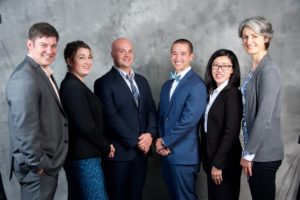 book we read for Operations Management, “The Goal,” I had read for undergrad at The Evergreen State College, but rereading was great to think about it again, and I even loaned it to a colleague. This is one thing that is different about doing an MBA in the public sector the goal is not to make money. I was able to translate concepts from Operations Management into thinking ‘What is the goal of this policy? What is the goal of this program?’ The goal of my job is to help save as much energy as possible.
book we read for Operations Management, “The Goal,” I had read for undergrad at The Evergreen State College, but rereading was great to think about it again, and I even loaned it to a colleague. This is one thing that is different about doing an MBA in the public sector the goal is not to make money. I was able to translate concepts from Operations Management into thinking ‘What is the goal of this policy? What is the goal of this program?’ The goal of my job is to help save as much energy as possible.
It has been great to work directly with classmates to identify ways that government and business work together to create better outcomes for everyone. I personally believe and have seen that business and government don’t have to have the classic adversarial “regulation” relationship. There are many opportunities to work towards mutual goals and synergize efforts.
It has been great to work directly with classmates to identify ways that government and business work together to create better outcomes for everyone. There are many opportunities to work towards mutual goals and synergize efforts.
Do you have any advice for someone from the government sector looking into an MBA?
With the boom of Seattle and tech companies, Washington state is looking at what to do to be a competitive employer. If someone is currently a public sector employee and wants to expand their horizons, you can’t go wrong getting an MBA from the Foster School. There are many translatable skill sets, and you might find ways to think about public service a little differently.
There are many public sector employees, myself included, where interacting with business is a significant part of our roles. In my case it’s through energy projects. Sometimes it’s economics, employment, workplace safety, policy development, taxes. The more public sector employees who interact with businesses understand business, the more successful you can be in those relationships. As someone who has also worked with public employees and programs as a business and industry representative, I feel that this program has made me a better public servant.
And if you end up in an MBA, I personally always think about “saving state resources” instead of “profit”. Make sure to spend time building relationships and bridges. Share a different perspective with the class, it will only strengthen everyone’s experience.
1 Response
Leave a Reply
You must be logged in to post a comment.

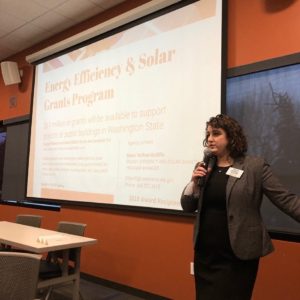
bu harika